Many people wonder if they should fix plumbing problems themselves or call in a professional.
Some plumbing fixes look easy and can save money if done on your own.
But there are risks, too, such as making a small problem worse or facing issues with safety and the law.
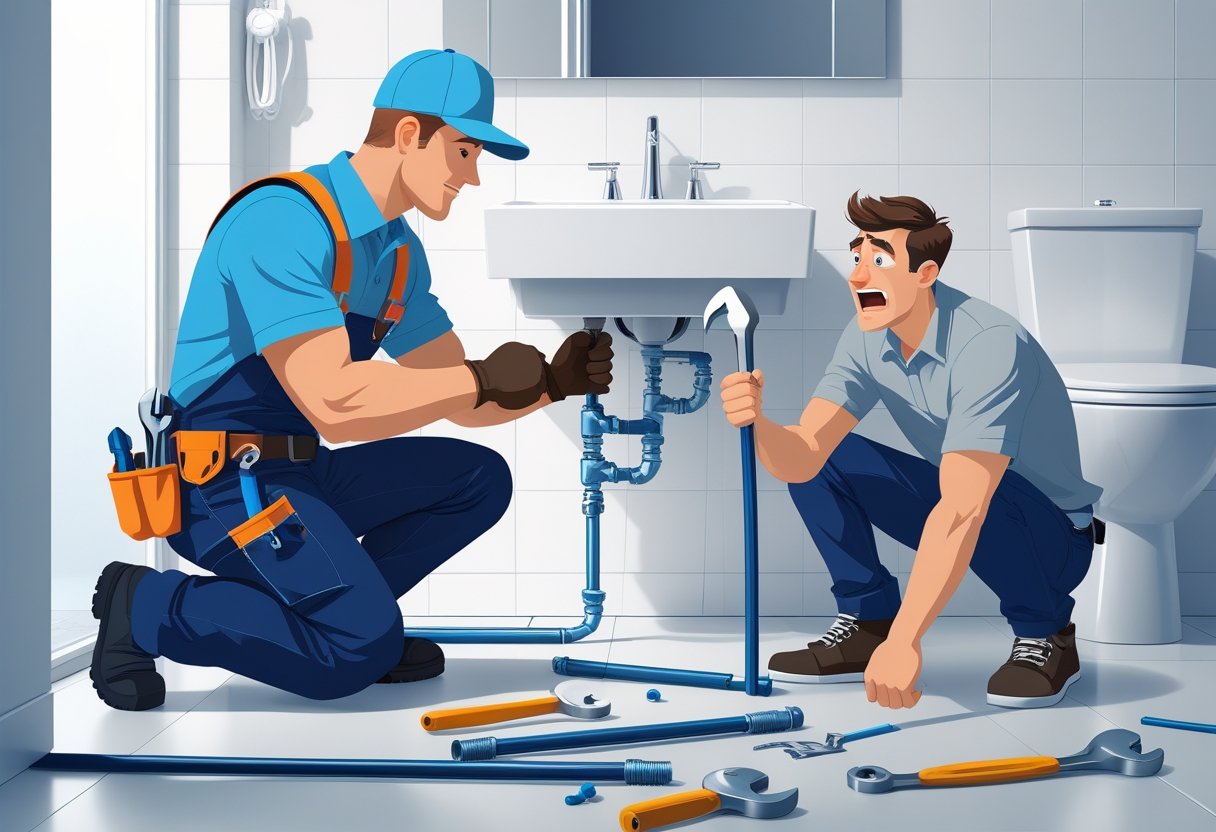
Professional plumbers know how to handle tricky situations and make sure the work meets the right standards.
Need a Home Fix – Emergency or Routine?
From leaks and no-heat nights to simple tune-ups, our 24/7 hotline connects you with trusted local pros in minutes.
With DIY repairs, mistakes can happen and repairs might not last.
Choosing between DIY and a pro depends on how complex the job is, the cost, and how much time someone has.
It helps to know what is safe to do alone and when it’s best to get expert help.
Key Takeaways
- Professional plumbers are best for difficult or risky plumbing jobs.
- DIY can save money but has hidden risks and may not last.
- Weigh cost, time, safety, and when expert skills are needed.
Understanding the Role of a Professional Plumber
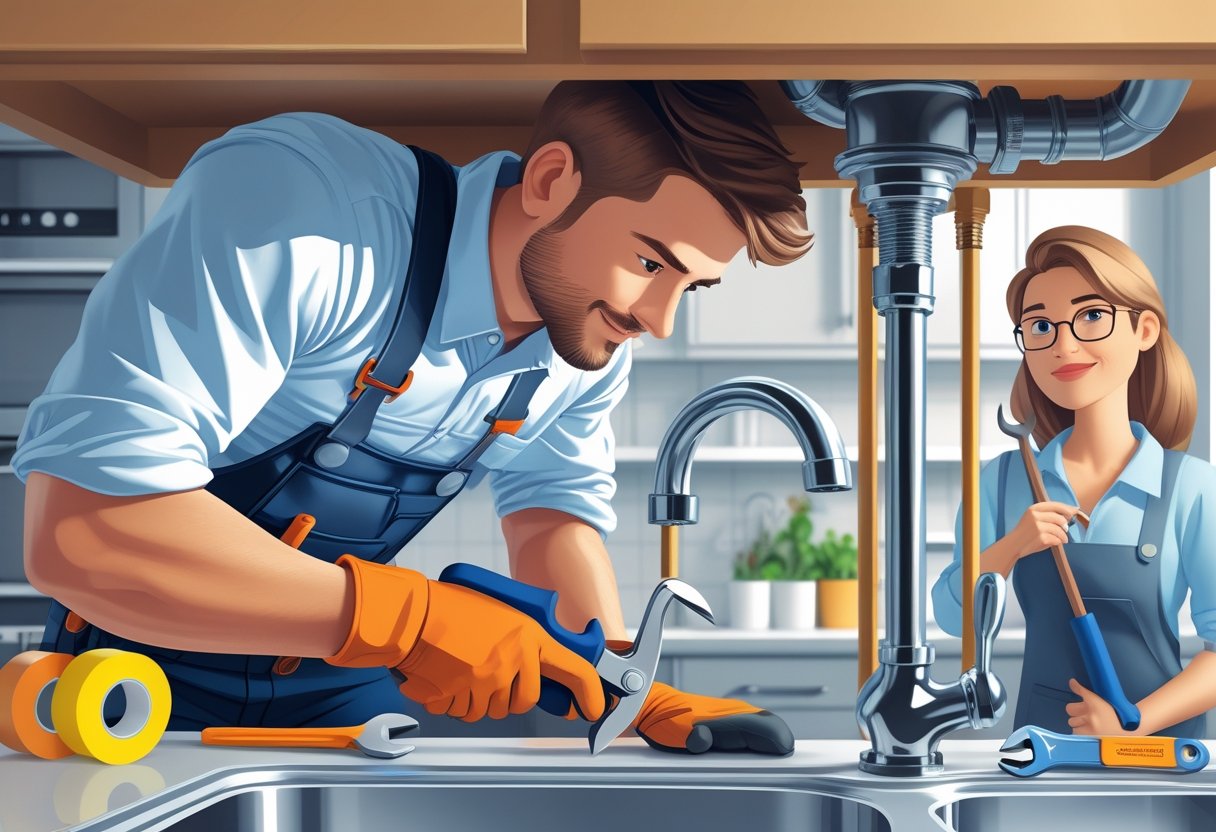
A professional plumber brings proven skills, training, and experience to home repairs.
They handle many types of jobs, from fixing leaks to installing new pipes, and know how to follow safety rules and building codes.
Plumber Qualifications and Certifications
Professional plumbers receive thorough training before they start working on homes or buildings.
Most complete an apprenticeship, which combines technical schooling with hands-on experience.
This takes about 4-5 years.
Plumbers need a license in most places.
To get it, they must pass tests on safety, local codes, and plumbing methods.
Some plumbers continue their education each year to keep their license active and learn about new tools and rules.
Many plumbers also hold certifications for special tasks:
- Backflow prevention
- Gas fitting
- Green plumbing practices
This training helps them do safe, high-quality work, especially on jobs that could affect your health or the structure of your home.
Range of Services Offered
Professional plumbers offer a wide list of services.
They install, repair, and replace water pipes, drains, fixtures, and water heaters.
They also handle sewer lines, sump pumps, and garbage disposals.
Besides fixing water leaks or clogged toilets, plumbers help with large projects like bathroom or kitchen remodels.
They can move pipes and set up new plumbing for showers, sinks, and appliances.
Some provide emergency service for urgent problems, like burst pipes or overflowing toilets.
Plumbers often help homeowners choose the best materials for repairs or upgrades, making sure everything meets code and works safely.
Common Plumbing Problems Handled
Professional plumbers deal with many common problems that happen in homes and businesses.
These include:
| Problem | Example |
|---|---|
| Leaks | Dripping faucets, leaking pipes |
| Clogs | Blocked sinks, tubs, or toilets |
| Low Water Pressure | Weak flow from faucets or showers |
| Water Heater Issues | No hot water, tank leaks, strange noises |
| Sewer Backups | Bad smells, drains backing up |
They also tackle hidden issues, such as pipes that freeze in winter or slow-draining fixtures caused by pipe corrosion.
Plumbers use special tools like pipe cameras to find where the issue starts.
Because some plumbing problems can lead to water damage or mold, quick and accurate repairs are important.
Professional plumbers know how to fix both small and large plumbing issues without making mistakes that could cause more trouble later.
DIY Plumbing: What You Need to Know
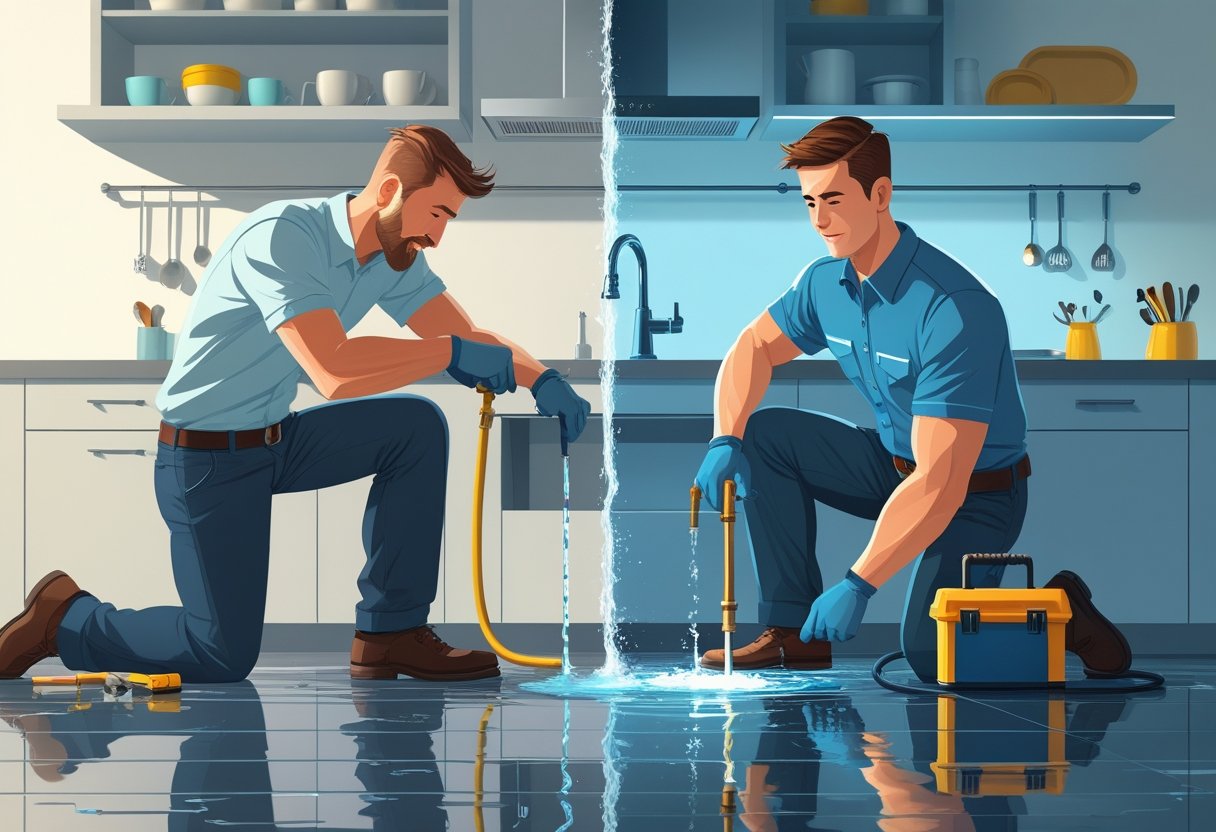
DIY plumbing is possible for some small home repairs.
Some projects are easy to handle with the right tools and proper knowledge, but mistakes can lead to bigger problems.
Essential Skills and Tools
Basic plumbing work requires following simple steps and using common hand tools.
It is important to know how to turn off the main water supply and read basic instructions on product packages.
Careful attention to detail and patience are necessary to avoid mistakes.
Common tools for DIY plumbing include:
- Adjustable wrench
- Plunger
- Pipe wrench
- Teflon tape
- Screwdrivers
- Bucket
Knowing how each tool works helps make the job smoother.
Learning how to use plumbing tape, find leaks, and tighten connections the right way can help prevent future problems.
Safety goggles and gloves are also important for protection.
Typical DIY Plumbing Tasks
Many homeowners can fix small plumbing issues themselves.
Tasks that most people can do include:
- Unclogging drains with a plunger
- Replacing faucet washers or aerators
- Installing or replacing showerheads
- Stopping minor faucet leaks
- Changing toilet flappers
- Fixing running toilets
These jobs have clear steps and do not usually need special skills.
More advanced repairs, like fixing a main water line or installing a water heater, should be left to a professional.
Risks and Limitations of DIY Repairs
Attempting complicated plumbing tasks without proper experience can make things worse.
Leaks, water damage, and mold can happen if connections are not done right.
One common risk is breaking older pipes or overtightening fittings, which can cause cracks or bursts.
Using the wrong type of sealant or missing a step in the repair process can also lead to costly water leaks.
Some repairs, like handling sewer lines or dealing with gas pipes, are not safe for DIY.
These jobs often need a permit or must meet local codes.
Mistakes in these areas can be dangerous or even illegal.
If unsure, it is best to call a licensed plumber.
Comparing Costs: Professional Plumber vs. DIY
Cost is often the first thing people consider when facing plumbing repairs or upgrades.
Comparing what you pay and what you may save helps make a smart choice.
Upfront Pricing and Hidden Expenses
Hiring a professional plumber usually comes with clear, upfront fees.
These include the cost of labor, materials, and sometimes a service call charge.
Many plumbers give estimates before starting work, which helps homeowners plan ahead.
DIY plumbing can look cheaper at first glance.
The main costs are tools and parts from the hardware store.
However, first-time DIY-ers often need to buy basic tools like wrenches and sealants.
These costs can add up, especially if a project requires special equipment.
Unexpected issues may arise during a DIY job.
Missing a step or making a small error might lead to leaks or water damage, which can be costly to fix.
Below is a table outlining possible expenses:
| Expense Type | Professional Plumber | DIY |
|---|---|---|
| Service Call Fee | $50-$100 | $0 |
| Hourly Labor | $75-$150/hr | $0 |
| Materials | Included or extra | $30-$100+ |
| Tools | Usually included | $25-$200+ |
| Repairs (if mistake) | $0-$500+ extra | $100-$1,000+ extra |
Long-Term Value and Potential Savings
Professional plumbers often offer guarantees or warranties on their work.
This means if a problem returns, follow-up fixes could be free or discounted.
Their experience also reduces the risk of future problems.
DIY projects save labor costs but may miss smaller issues a trained eye would catch.
If DIY repairs fail, there is a risk of water leaks, mold, or damage to floors and walls.
These can mean expensive repairs in the future.
Hiring a professional may prevent repeat work and accidental damage.
The money spent upfront can reduce the total spent over time, especially for larger or complex jobs.
DIY might be a better fit for small fixes, but the risk is higher if mistakes are made.
Quality and Reliability of Workmanship
Choosing between a professional plumber and doing it yourself affects the final results.
Differences in skill, tools, and experience often show in the long-term function of plumbing work.
Standards of Professional Work
Professional plumbers follow strict building codes and industry standards.
They are trained and licensed to handle plumbing systems correctly.
Their work must meet legal and safety requirements, which helps lower the risk of leaks, water damage, or code violations.
Professionals use specialized tools and know how to spot hidden problems, such as weak pipes or poor drainage.
They use durable materials and tested techniques to make joints watertight and secure.
Many companies offer warranties on their work, giving extra protection if something fails later.
Quality checks are common in the plumbing trade.
Professionals check their work for leaks and test fixtures before leaving the job.
This lowers the chance of future repairs or damage to the home.
Common DIY Plumbing Mistakes
DIY plumbing projects can save money but come with risks.
Many homeowners use the wrong parts or materials for repairs.
This can lead to leaks or damaged pipes.
Incorrect installation is another common issue.
For example, over-tightening connections can crack pipes or strip threads.
Using the wrong sealant can result in slow leaks behind walls or under floors.
Not shutting off the water fully before a repair may cause floods.
Sometimes, DIY fixes repair only visible damage, missing hidden problems like mold or corrosion.
In some cases, mistakes can void warranties or insurance coverage.
A simple checklist most overlooked by DIYers:
- Turn off water supply
- Use proper pipe fittings
- Seal joints with approved materials
- Test all connections for leaks
- Know local codes before starting
Missing even one step can cause more problems than it solves.
Time and Convenience Considerations
Hiring a plumber or doing it yourself can have a big effect on how long a project takes and how easy the work feels.
Factors like skill level, available tools, and daily schedules play a major role in timing and convenience.
Project Completion Times
A professional plumber is trained to spot problems quickly and choose the right fix. They often finish common jobs like fixing leaks or unclogging drains in a few hours.
Larger projects, such as replacing a water heater, might take a day.
By comparison, a homeowner without much experience may need a lot more time. DIY projects can stretch into several days.
Tasks like watching video tutorials, shopping for parts, and fixing mistakes slow things down. Sometimes, a lack of special tools also causes delays.
Here is a simple look at typical times:
| Task | Plumber | DIY |
|---|---|---|
| Leaky faucet repair | 1 hour | 2-4 hours |
| Toilet replacement | 2 hours | 4-8 hours |
| Water heater install | 1 day | 2-3 days |
These time differences can be important if plumbing is needed right away.
Scheduling and Availability
Many plumbers offer flexible scheduling, including weekends or emergencies. Customers can book appointments at times that fit their needs.
Some companies even provide 24/7 services for urgent problems.
Doing the job yourself may only be possible during free hours, such as evenings or weekends. This can leave jobs unfinished if other responsibilities come up.
Delays might occur if tools or parts are not handy, or if the task is more complex than expected.
Safety and Legal Compliance
Professional plumbers follow strict rules to make sure plumbing work is safe and legal. Doing plumbing yourself can mean risks to health and trouble with the law if codes are not followed.
Building Codes and Permits
Plumbing work must meet local building codes for safety and quality. These codes list materials, pipe sizes, and how systems should be installed.
If a person doesn’t know the codes, mistakes can lead to leaks, water damage, or fines. In many places, a permit is required for new plumbing or major repairs.
Without a permit, work might have to be redone or inspected, costing more money. Professionals know when a permit is needed and handle inspections.
This helps work pass the final check from the city or county.
A list of common code issues includes:
- Using the wrong type of pipe
- Incorrect venting
- Not enough support for pipes
Health and Safety Risks
Plumbing deals with water, waste, and sometimes gas lines. Poor work can cause leaks, flooding, or even gas leaks, which are dangerous.
Faulty plumbing can lead to mold, water contamination, or electrical hazards if water reaches wiring.
Some plumbing jobs use tools that are sharp or heavy. Without the right training, injuries can happen.
Professional plumbers use protective gear and know how to handle unsafe situations like burst pipes or sewer backups.
Mistakes in plumbing can put a home’s residents at risk. It is important to weigh these risks before trying to fix plumbing without experience.
When to Hire a Professional Plumber
Some plumbing situations are too complicated or risky to handle alone. In certain cases, hiring a professional is the safest and most reliable option to prevent costly mistakes.
Complex and Emergency Situations
Plumbing issues such as major pipe leaks, burst pipes, and sewer backups require immediate attention. These problems can cause water damage, mold growth, and even structural issues if not fixed right away.
Tasks like installing water heaters, handling gas lines, or rerouting pipes involve risks that can impact safety.
If plumbing repairs need special tools or knowledge, a professional can complete the job correctly. Attempting complex fixes without training can make the problem worse.
Hiring a plumber for emergencies ensures that building codes and safety guidelines are followed. Quick action from a licensed expert helps reduce further property damage and keeps households safe.
Warranty and Insurance Issues
Most home plumbing systems and appliances, such as water heaters and dishwashers, often come with warranties that can become void if repair work is performed by someone unlicensed.
Insurance companies may reject a claim if the work is not completed by a certified plumber.
Some repairs must be done by a licensed professional to protect the homeowner’s rights. If a DIY repair fails and causes damage, homeowners could be left with large bills that insurance will not cover.
To avoid problems with warranty and insurance coverage, it is best to let qualified plumbers handle any work that could affect claims, agreements, or legal requirements.
Sustainability and Environmental Impact
Hiring a professional plumber can help reduce water waste. Plumbers know how to fix leaks and install water-saving fixtures.
This means less water gets wasted compared to some DIY fixes that might not hold up over time.
Table: Environmental Impacts
| Factor | DIY | Professional Plumber |
|---|---|---|
| Water Waste | May increase if errors | Usually minimized |
| Chemical Use | Possible overuse/misuse | Proper handling/disposal |
| Fixture Lifespan | May shorten if mistake | Likely longer-lasting |
Professionals are trained to follow safety guidelines for handling chemicals like pipe cleaners and sealants. They are more likely to dispose of waste parts and chemicals the right way, lowering the chance of polluting the environment.
Many plumbers recommend or use fixtures with Energy Star or other certifications. These products are made to use less water and energy, which supports sustainability goals.
DIY repairs sometimes lead to repeat work or replacement of new parts sooner. This can lead to more material waste.
When a plumber does the job correctly, pipes and fixtures are less likely to fail, reducing extra waste and the need for future repairs.
Conclusion
Hiring a professional plumber often means faster repairs and fewer mistakes. They bring experience, the right tools, and know the best codes for safe work.
DIY plumbing can save money upfront. However, wrong steps can lead to water leaks, damage, or higher costs later.
Some small tasks, like fixing a dripping faucet, may be manageable for beginners.
Key Differences:
| Professional Plumber | DIY | |
|---|---|---|
| Skill Level | High | Usually basic or moderate |
| Cost | More up front | Less if successful |
| Risk | Low | Higher if done wrong |
| Time | Often faster | May take longer |
Consider the project’s difficulty, your skills, and local laws before deciding.
If the repair is major, or you feel unsure, it may be smarter to call a licensed plumber. For simple jobs, those with some tools and patience might feel confident trying it themselves.
Frequently Asked Questions
Some plumbing jobs are not safe to do alone, while others may cost more to fix if mistakes are made. Home insurance, safety, and job complexity can be affected by a person’s choice between DIY and calling a licensed plumber.
What are the risks associated with DIY plumbing repairs?
DIY plumbing repairs can lead to water damage if mistakes are made. Faulty repairs may cause leaks, mold, or even structural problems.
In some cases, doing the wrong repair can make the problem worse or be dangerous.
How do costs compare between hiring a professional plumber and doing it myself?
DIY can save money on labor, but mistakes can lead to higher repair bills later. Professional plumbers may cost more up front, but their work is less likely to need costly fixes in the future.
Homeowners may also need to buy special tools or parts for DIY that a plumber would already have.
What type of plumbing jobs should only be handled by professionals?
Jobs involving gas lines, sewer lines, and main water lines should be left to professionals. Major plumbing changes or projects that require city permits are also best handled by licensed plumbers.
Anything that involves complex systems or high pressure can be risky for amateurs.
Can DIY plumbing work affect my home insurance policy?
Unapproved or faulty DIY plumbing work can sometimes void a home insurance policy. If an insurance company finds that an unlicensed person did the work, they may not pay for damage.
It is important to check the insurance policy before starting any plumbing work.
What are the benefits of hiring a licensed plumber versus a handyman?
A licensed plumber has been trained and certified to meet safety codes and regulations. They are more likely to have experience with many types of plumbing problems.
Handymen may not have the same level of training, and their work may not be covered by warranties or insurance.
How do I know if a plumbing problem is beyond my DIY skills?
Signs a job is too complex include persistent leaks, low water pressure, or strange noises in the pipes. Water backing up is also a warning sign.
If a repair needs cutting into walls or changing major parts, it should be left to a professional. Dealing with gas lines is another situation that requires expert help.
Uncertainty about how plumbing systems work is also a sign to call for help.
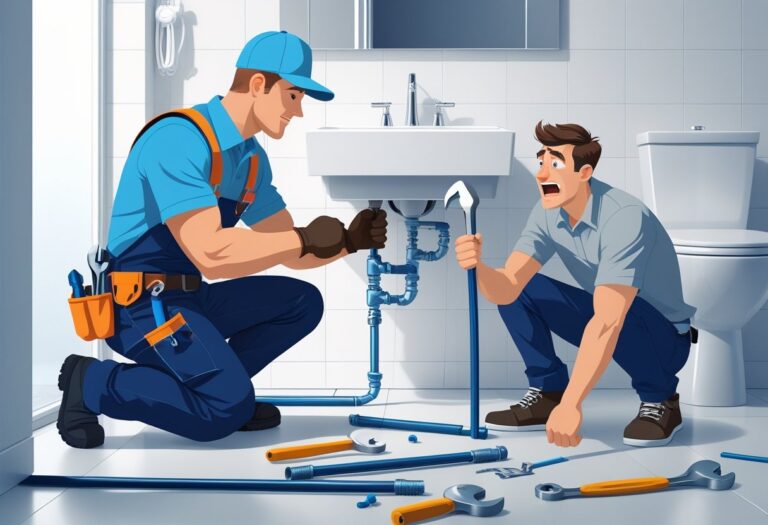

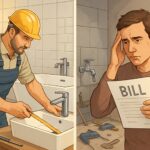




Leave a Reply